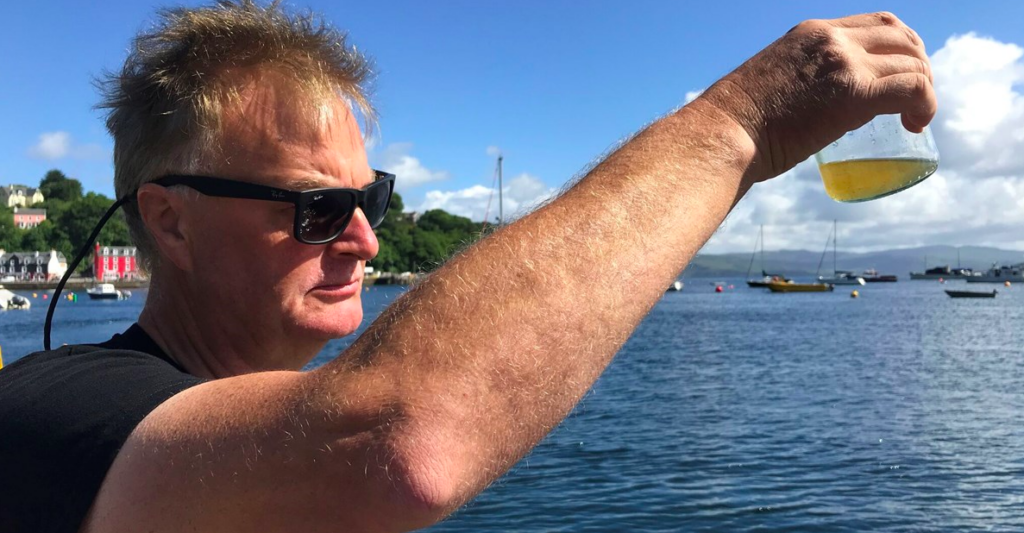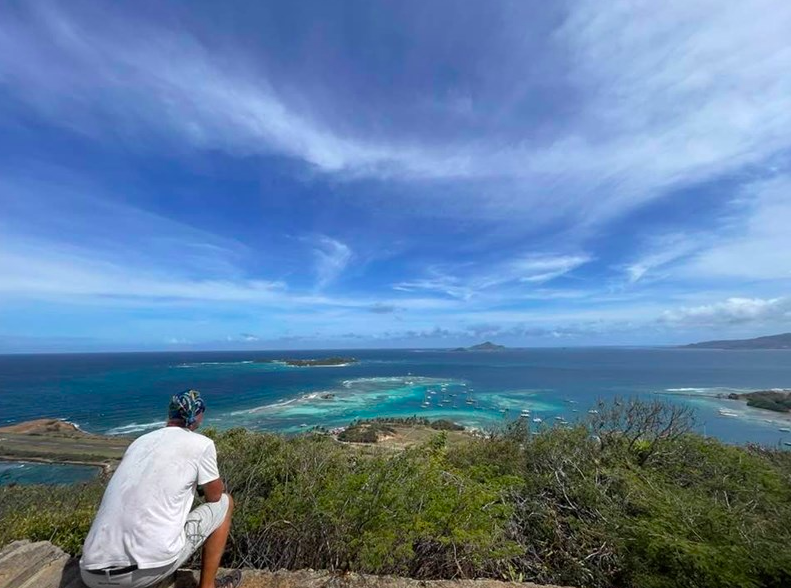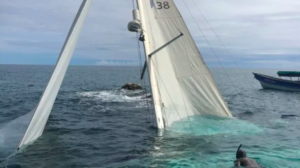Equatorial Atlantic ‘pretty much dead’ says scientist as plankton wiped out

Edit: This article has been revised to make clear the samples studied by the Global Oceanic Environmental Survey Foundation were taken from the equatorial Atlantic. The research findings have not yet been confirmed by other scientists or research teams (16 Aug 2022).
An Edinburgh-based research team says plankton, the tiny organisms that sustain life in the seas, has all but been wiped out. The team’s spent two years collecting water samples from the equatorial Atlantic and in a dire warning says this means the equatorial Atlantic’s ‘pretty much dead’.
At the bottom of the food chain, plankton is consumed by the krill which are fed on by the fish that, in turn, provide nutrition for terrestrial animals including billions of humans.
The research has been conducted by GOES (Global Oceanic Environmental Survey Foundation) using its yacht Copepod which has collected samples from the Atlantic and the Caribbean. From Scotland, it sailed along French and Portuguese coasts before crossing the Atlantic and is currently in Colombia, before setting sail for Panama.
The sea water samples examined by the team were taken from the equatorial Atlantic and the research findings have yet to be confirmed by other maritime scientists or research teams.
GOES has also provided monitoring equipment to other sailing boat crews so that they can perform the same trawls and report back with their results.
“Given that plankton is the life-support system for the planet and humanity cannot survive without it, the result is disturbing,” says marine biologist and former Scottish Government adviser Dr Howard Dryden. “It will be gone in around 25 years. Our results confirmed a 90% reduction in primary productivity in the Atlantic. Effectively, the Atlantic Ocean is now pretty much dead.”

According to the Sunday Post, the research blames chemical pollution from plastics, farm fertilisers and pharmaceuticals. Previously, it was thought the amount of plankton had halved since the 1940s, but the evidence gathered by the Scots suggest 90% has now vanished in the affected areas.
‘An environmental catastrophe is unfolding,’ says the report. ‘We believe humanity could adapt to global warming and extreme weather changes. It is our view that humanity will not survive the extinction of most marine plants and animals.’
That threat is deemed as ‘a few years’ away before the consequences of plankton loss become catastrophically clear when fish, whales and dolphins become extinct.
The team has compiled and analysed information from 13 vessels and more than 500 data points.
The researchers expected to find up to five visible pieces of plankton in every 10 litres of water – but found an average of less than one. Conversely, they’d expected to discover 20 microscopic specks of toxic particles per litre of Atlantic water – but actually counted between 100 and 1,000.
The discovery, says the research, suggests that plankton faces complete wipe-out sooner than was expected.
Plankton needs the right conditions to thrive, and perform its other role of helping oceans absorb carbon dioxide and giving off the chemical dimethyl sulphide, which assists in creating clouds. Where it thrives in slightly alkaline waters, the oceans are slowly turning more acidic.
An overload of CO2, says the Sunday Post, along with a deluge of lethal manmade chemicals in cosmetics, plastics, sunscreen, drugs and fertilisers, is inundating the marine environment. It’s all toxic to underwater life and once the water reaches a tipping point of acidity, vast amounts of plankton will simply dissolve.
‘If we destroy plankton, the planet will become more humid, accelerate climate change, and with no clouds it will also become arid and wind velocities will be extreme,’ says the report.
‘Yes, of course, we need to continue to reduce CO2 emissions but even if we were carbon-neutral, it will not stop ocean acidification – it will not stop the loss of all the seals, whales, marine birds, fish and food supply for two billion people.
‘CO2 reduction won’t even stop climate change; indeed, we will have catastrophic climate change because we have not fixed the primary root cause – the destruction of nature by toxic chemicals and substances such as plastic.
‘We have two choices. We can choose to wake up, understand and address the real issue or choose the game-over button for humanity come 2050.’
“Based on our observations, plankton numbers have already crashed and are now at the levels that I predicted would not happen for another quarter of a century,” Dryden told the Sunday Post.
“We surveyed the Caribbean from St Lucia to Grenada. Now the only fish available in restaurants there is imported farmed Atlantic salmon.
“It had been reported that 50% of the coral was gone; our observations were that the coral is 100% gone in many locations and 90% gone in all locations.
“We cannot stop climate change by simply reducing CO2 emissions. However, we can clean up our pollution to give us clean air and clear rivers and bring life back to the oceans. We could potentially live with climate change, but we will not survive the destruction of nature. If we can bring back nature, though, we also solve climate change.”
He said that during the pandemic, because of the lack of tourism, ecosystems had started to recover. Fish have returned and coral reefs have recovered.
“People cause pollution, and in most of the world there is no effluent treatment. Covid has shown us that if we eliminate pollution then ecosystems have high capacity to spring back.
“Scotland has already wiped out most of its fish, deep-water coral and polluted most of the coast. Trawling has destroyed seagrass, the loss of which is equivalent to the UK aviation carbon budget. The marine mammals in Scotland are among the most toxic on the planet.
“Scotland could set an example to the rest of the world and declare the country a non-toxic environment. Currently, we have a combined storm water and sewer system, so when it rains the municipal treatment systems are by-passed.
“This means we may only be treating as little as a quarter of our waste water.
“We will not stop making plastic but the new forms should be non-toxic and biodegradable.
“We need to turn to regenerative agriculture. We have already wiped out 80% of all insects and 100% will be gone in 20 years, then agriculture collapses because there is no pollination.”
In a recent report, UK NGO Environment Investigation Agency says that marine plastics will have outweighed the total mass of fish in the world’s oceans by 2050, and the production of plastic pollution constitutes a planetary emergency.
While many organisations are working on cleaning the oceans after the water is polluted, Ocean Cleanup has begun work on intercepting plastic pollution in what it thinks is the heaviest polluting river in the world by making a fence which stops rubbish getting into the sea.












Very depressing news in this article, what can be done? – desparately need strong messaging and awareness out in mainstream media to get the conversation going
Shocking, utterly shocking. Please someone tell me / us what has to be done. No more lobby-isms, just do-isms. Someone stop it or tell me how to stop it all.
Make it known, Together We Stand Divided We Fail. It’s not about making money, money, money , being greedy or being better or having more than the next person. Nature is more important and it needs us. We need to step up to the plate and do something as a species even if it takes ignoring those that be and have ,who also let the wrong things happen for a buck and make the rules for some mentality. So spread this article to the world. Share Share and Share. Tell everyone you know and meet. We need to maybe sacrifice some of our own luxuries but it’s time to grow some balls. Sorry but that’s just the way it is. In Australia we need to STOP the jobs for mates in government on 500,000 a year salary that don’t care and get people that do,. not just about their pay packet. My heart is hurting and the tears are coming down I knew it was bad but not this bad. How can a species that thinks it’s so smart destroy its home and its own survival . That’s just not right .It is just complete lunacy ! What’s going on ? Who,s running this mugs game because they obviously don’t care maybe another agenda , dumb as dogs crap , aliens, demons or just plain uncaring, selfish, insane narcissists. I could swear but the rest of us are just letting it happen. Some and I guess most of us just making life easier not going against the grain and go along with the corrupt, outdated and unfair rules ,regulations, laws (written in jargon that most don’t understand anyway) and opinions of society hoping to get a piece of the pie . I know it’s not going to be easy but we have to abolish this crud and change the mindset of the majority . I hope their are truely enough people up for it to turn the tide on this blatant reap and pillage of the natural world. I don’t know how to change people’s attitude or their mindset that has been programmed into them but we,be got to do something and by spreading the word maybe someone that does will have the answer. NUTURE NATURE. Money can’t buy it. I know what I’d prefer . What about you ??????? Millions of lives have been lost in wars fighting for the land to live on which isn’t going to exist. It’s insane. Free Julian Assange. The man has the courage of a lion and the heart of a whale. He has sacrificed himself to let us see the truth of the powers that be who have let this happen and he is still being tortured in prison and given back to the enemy. That’s what they are ! Think about it people !!!!!!!
Yet another very clear signal that the next Great Extinction is underway, yet we humans still fail to recognize that we are part of an interconnected system. Our self-absorption, greed and wilful ignorance continues unabated but, with bold leadership we still may “just” have a chance to redesign our economies, our political and social systems and ourselves.
If I knew how to help I would quit today and go do it.
Carbonic acidification (dissolved CO2) and agricultural runoff may be a big part of the problem, but so is the stuff we put in paint to make it lighter, TiO2 (titanium dioxide) which makes normal levels of UV light destroy plankton. This was known 10 years ago.
https://earthsky.org/human-world/uv-from-sunlight-excites-nanoparticles-to-kill-phytoplankton-in-lab-setting/
The Gulf stream has stopped. Plankton is happiest with violent circulation, cold and hot water.
I am so grieved. Words can’t express the grief. I have wanted grandchildren, but not now. Nature, humanity, a thing of the past?
Thanks for this writeup. Best I’ve seen, depressing as it is.
Blah, blah, blah…
Trouble is these idiots have exaggerated so much in the past everyone I know takes things they say now with a hefty grain of salt.
Tell us the truth for goodness sake.
We’re big people.
Or…
Join a doomsday cult and stand on a street corner shouting ‘the end is nigh’ at passersby.
Hahaha
your ignorance must be blissful
Thanks for being part of the problem I guess.
I have no doubt that all, to some extent, of this is true. 500 sampling’s taken in 41.2 million square miles, in know areas of pollution along heavily populated areas, makes me wonder, not about the outcome, but it’s about the time line. That being said evidence of this type of destruction is everywhere. We are a horrible species. We consume natural and food resources, with total abandon we embrace whatever chemical short cut for the sake of agricultural projection and profits. We turn a blind eye to the destruction we cause directly and indirectly in all that we do. Billionaires play with rockets joyriding ticket holders for 6 minutes “in space” while setting their sites on Mars. I was a kid in the 1960’s and so enamored with the thought of space travel. Now I think no freakin way. Learn to respect this planet and prove that we can care for it the way this miracle of the Big Bang and evolution created instead of wiping our behinds on this one and flying off to ravage and destroy another one. Evidence of this is everywhere land, sea, rivers, lakes, oceans you name it we’re recking it.
Stop buying sun screen and other products that are named in this article, and pick up plastics that you see thrown onto the ground regardless where you see them. Don’t throw down plastics either as eventually they will arrive in the sea.
At least half of Earth’s oxygen comes from the ocean.
The surface layer of the ocean is teeming with photosynthetic plankton. Though they’re invisible to the naked eye, they produce more oxygen than the largest redwoods. Scientists estimate that 50-80% of the oxygen production on Earth comes from the ocean.
It is possible to live plastic free, and to use biodegradable products. I’m shocked at the needless plastic packing of fruit and veg in every British supermarket. Buy from eco friendly suppliers, buy less, waste less, be more mindful about consumption. Change pollutant products one by one to eliminate them, but start now.
The original article wasn’t accurate,
https://arstechnica.com/science/2022/07/no-the-oceans-are-not-empty-of-plankton/
Does anyone actually know what the degraded plastics turn into when they biodegrade?
I do not know but I suspect that the plastics lose their cohesion and simply break down into smaller and smaller pieces – ending up as the micro plastic particles we are now complaining about.
Fake News: https://www.woxx.lu/falschinformationen-im-netz-das-plankton-das-nicht-verschwunden-ist/
https://twitter.com/wang_seaver/status/1548750630914703362
Wait. So Dryden said that likely 90% of plankton in the Atlantic is gone and ahead of the Goes Foundation’s schedule of 75-80% loss by 2045? So their foundations plan is now defunct and the ocean(s) will as they stated on their GOES foundation website now go to a PH of 7.95 basically a loss of all carbonate life so good bye to whales, dolphins, fish, plankton, etc.
So it’s over? The article still states their goals and what we can do to fight it, but this seems based on now old information I’m confused by this.
I agree with most of the article and am shocked, however, I have a problem with some of the contradictions in this article, that have caused me to lose some trust in it…take two contradictory sentences/statements for instance about 90% of the coral being gone and then “coral reefs have recovered”…what?, no they have not. It would take hundreds of years for them to recover, not a month of covid lockdown.
“It had been reported that 50% of the coral was gone; our observations were that the coral is 100% gone in many locations and 90% gone in all locations.”
…”He said that during the pandemic, because of the lack of tourism, ecosystems had started to recover. Fish have returned and coral reefs have recovered.”
If you only go across to the Goes Foundation you’ll see they predict that by 2045, 90% of all plankton will be lost. But this carelessly-written (plagiarised / borrowed) post claims that 90% is already gone:
“According to the Sunday Post, the research blames chemical pollution from plastics, farm fertilisers and pharmaceuticals. Previously, it was thought the amount of plankton had halved since the 1940s, but the evidence gathered by the Scots suggest 90% has now vanished”
Yes, it’s bad enough that it’s on track for 2045 but it’s not helped by careless shitty click-bait ‘journalists’ fundamentally mis-representing the findings. Moral of the story, go directly to the Goes Foundation Environmental Survey, assess whether they are credible or not – and read what they have to say on the issue.
So many thoughtful comments on this extremely distressing news of the Atlantic plankton’s coming demise, that it’s hard to find anything important or insightful to add.
But I will add that my distress is over the innocent marine life of all kinds, just floating, swimming and drifting, enjoying their lives and their interactions with each other, presumably unaware that “those big two-legged beings on shore” seem to be doing everything in their capacity to destroy this watery paradise. I bet in some of their deeper musings, they even wonder what’s wrong with humans, in the same way that we ponder what is wrong with “those school shooters”, etc.
But I have to wonder, are there many researchers findiing Pacific plankton health in equally dire straits ? A quick search brought up Journal of Plankton Research, Ocean Conservancy and others, so there is plenty to read and absorb when time permits.
Still, this article was possibly the most riveting, regarding climate science, I’ve read in many years. I’ll add Pacific plankton to my meditations. Thanks for posting and jarring us into reality.
We need to take part in Civil Resistance to force government action. Nothing else is working this is our last chance. We’re doing this internationally, join us.
Www.juststopoil.org
It’s not Scotland that has destroyed the oceans, it’s big oil companies, shell, BP etc. They have spills on the regular, and I’m no expert but I’m pretty sure fish and krill and plankton can’t eat crude oil…
I can’t put into words how full of grief this makes me feel; anger, sadness, guilt. But I was given a tiny bit of hope by the posters above saying “what can I do to help”. We can all help. There are many environmental campaigning groups, and they DO need you. We need to get organised and work with others to bring about change. Now is the only time we have. How about https://oceanrebellion.earth or Greenpeace for starters. Don’t give up, let your grief and rage take you to a place of action.
I am feeling so much grief, sadness and perhaps guilt reading this article. It’s almost too much to bear.But I am so comforted by the commenters above who feel it too and want to help. I believe there is still time for the world to make changes to remedy this situation, but we need to act now. Please take action. Join an environmental campaigning group – eg oceanrebellion.earth or Greenpeace or any group campaigning about the ecological and environmental emergency. Now is the time.
https://www.factcheck.org/2022/07/faulty-research-paper-leads-to-unfounded-claims-about-health-of-atlantic-ocean/?fbclid=IwAR0m1kL4fjFW9sMKaHNu9h40UcO5SJGrQqpRfGVksQ8518dQ_xa4hepXnoc